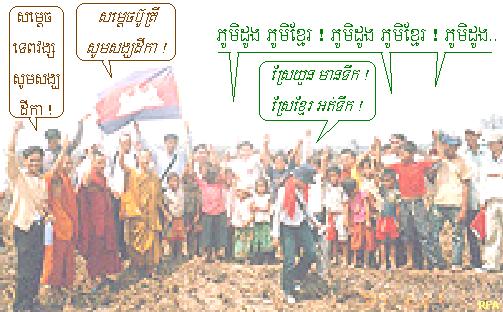
Photo by Sok Serey
| MEET WITH GOD |
PHN@M - P@NH - P@TINS | RENCONTRER DIEU |
| M. Preuk : Below is an alarming article published by RFA indicating that people living in the Phum Daung village near the Vietnamese border, have been ordered not to talk about border problems they are currently facing due to Vietnamese encroachments. People of Phum Daung have been constantly harassed by Vietnamese troops and these incursions were recently acknowledged by the Phnom Penh regime as well. Now, in order to fulfill their subservience to Vietnam, the Phnom Penh regime under the leadership of the Vietnamese lackey Hun Sen and which is sold out to Hanoi, is ordering silence from the part of the victimized Khmer population. This is a shameful and disgusting act from these lackeys of the foreigners! |

Photo by Sok Serey |
(UNOFFICIAL ENGLISH TRANSLATION) - While the National Assembly will meet
soon to discuss and [eventually] ratify the border treaty with Vietnam,
a report from Romeas Hek district [next to the Vietnamese border], Svay
Rieng province indicated that a group of local authorities had ordered
the local population not to talk on border problems with Vietnam.
Sok Serey is reporting: Representatives of the Khmer population in Phum
Daung village, Daung commune, Romeas Hek district, Svay Rieng province,
next to the Vietnamese border had protested and accused the local authorities
for ordering the local population not to talk about border problems with
Vietnam ; should they continue talking about it, their personal safety
will be threatened. According to the population living in Phum Daung village,
Daung commune, in which their families have been victimized by this threat,
Radio Free Asia (RFA) was informed that the threat has been issued last
week to 10 villages, including Phum Daung.
Mr Prak Chan, the police chief of the province of Svay Rieng said that
he did not know about this issue. As for Mr Var Kim Hong, the President
of the [government] legal and technical team for the border affairs said,
in reaction to the above accusation, that “the government has no plan
to do that. They [the local population] should not tell the news media
those political matters." An opposition MP who asked to remain anonymous,
said that “it is true that there were threat and order issued to the
population of Phum Daung village not to talk on anything that involve border
problem between Cambodia and Vietnam in that region.”
The accusation of the silence order on border problem came at the same
time as the National Assembly is about to discuss and ratify [eventually]
the supplemental treaty regarding the border delimitation between Cambodia
and Vietnam on Friday, November 11. This treaty is creating a lot of upheaval
recently.
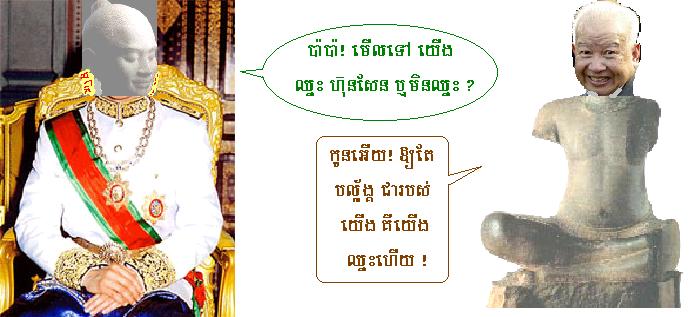
Sihamoni : Papa ! Qui va gagner entre nous et Hun Sèn
?
Sihanouk : Mon fils ! Pourvu que le trône est nôtre,
c'est nous qui gagnons !
|
(2005-Oct-21) Sakada Chun - Phnom Penh, Cambodia : The Cambodian government on border affairs' high ranking officials said that the Cabinet's Permanent Committee has sent the Supplemental Border Treaty to the 1985 Border Treaty to the National Assembly so that it can be included in the agenda for the Assembly floor debate. It got to the Assembly Friday morning. |
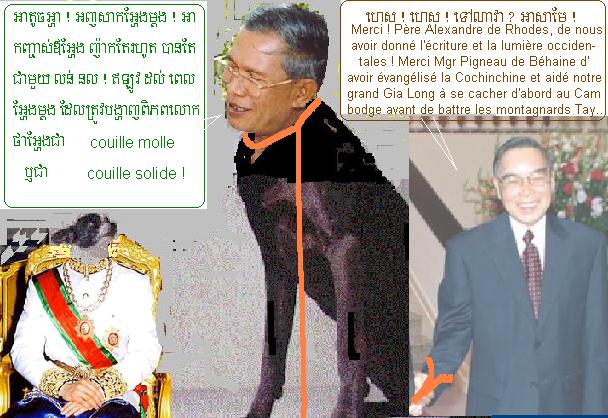 |
Cham poet awarded 2005 Southeast Asian Writers' Prize (2005-Oct-17)
Ha Noi (VNA) - Inrasara-Phu Tram, a Cham ethnic poet of Viet
Nam nationality, is among the nine Southeast Asian writers who were presented
with the 2005 Southeast Asian Writers' Prize award in Bangkok, Thailand,
on Oct. 12. Thai Princess Bajraktiyabha presented the prize to Tran for
his poem and epic, titled "Le Tay Tran Thang Tu". Tram is the first Vietnamese
ethnic minority to receive the prestigious prize since 1996. The prize
is aimed at honouring regional writers who have contributed to the development
of literature and art in their respective countries and promoting mutual
understanding among regional cultures.
Indocan Resources Applies for Cambodia Exploration Rights (2005-Oct-12)
PHNOM PENH, Cambodia, -- Indocan Resources
Inc (OTC: IDCN) today announces that the first two of four applications
to the Cambodian Government were filed today for the exploration rights
of coastal areas and offshore areas of the country. Cambodia has long been
known to have huge potential offshore oil and gas reserves worth
as much as 500 million dollars a year,
but a lack of infrastructure combined with disputes over ownership with
neighboring Thailand have hindered progress. Surveys suggest that the Overlapping
Claims Area (OCA) have high hydrocarbon potential with estimates of 11
trillion cubic feet of natural gas. If successfully extracted,
then the country could receive up to $1 billion per annum in revenue from
its fifty percent stake.
Equally contentious, though for completely different reasons, are Cambodia's
onshore basins. In the late 1990's the Japanese National Oil Corporation
(JNOC) conducted $20 million dollars' worth of aeromagnetic and gravity
surveys over the Tonle Sap (South East
Asia's greatest lake) and Mekong Delta basins. The survey area covered
54,000 sq km and identified two deep sedimentary features in the Tonle
Sap basin and a third in the Mekong basin. Indocan Resources president,
Jeffrey Bruhjell said that "In January 2005, ChevronTexaco announced that
its affiliate has discovered oil in four exploration wells in offshore
Cambodia Block A. The 6,278 square kilometer block, encompassing the Khmer
Basin with water depths averaging 240 feet, was awarded to Chevron
Overseas Petroleum (Cambodia) Ltd. (COPCL), and its partners in
March 2002. COPCL has a 55 percent interest in the block and is the operator.
Oil pay zone logged in the wells ranges from 41 feet to 139 feet. Analysis
of samples indicates the oil is 44 degree API crude." More information
is available at www.indocan.com.
A mysterious parliamentary committee (2005-Oct-08)
Samngatki : Xinhua News and several Asian newspapers reported
that: “The Premier [Hun Sen] said Cambodia's Council of Ministers and a
Parliamentary Committee have approved the proposal [to
sign an additional border treaty with Vietnam].” It is worth noting
that Cambodian public opinion is kept in the dark on this important national
issue. The mysterious parliamentary committee which reportedly approved
the proposal in secret is undoubtedly violating the Constitution.
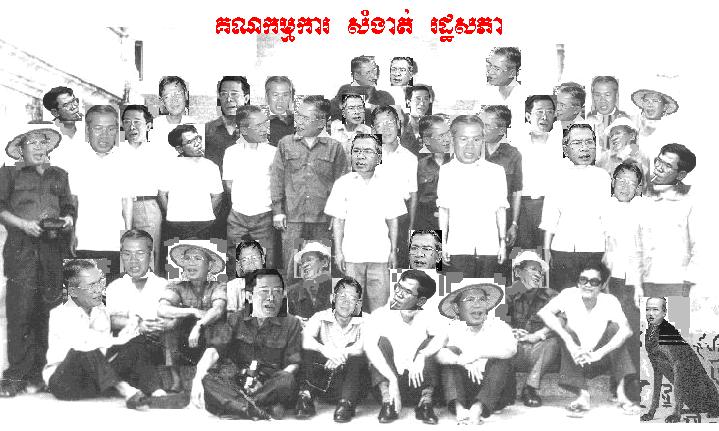
| Police block two border protest groups
(2005-Sep-30) K.I./ Voanews.com : Following the City Hall refusal to allow their demand for peaceful demonstration on border issues, five members of the Students’ Movement for Democracy were “invited” by force to the Tuol Kork police station. The five students were arrested when they walked out of their office. Witnesses said police officers seized all the signs and banners from the protesters and used force to break up the protest. Also, more than 100 police officers blocked the office of Khmer Kampuchea Krom Coordination Committee and prevented committee members from entering. The committee is planning a peaceful march to protest the arrival of Nguyen Tan Dung, Vietnam’s first deputy PM, who is expected to meet Hun Sen to discuss border issues. When asked about the government only allowing protests against opposition leader Sam Rainsy, Information Minister Khieu Kanharith said the protests do not involve marches. He also added that “the government is never biased.” (Source: Cambodia Daily). Cambodian civil societies and the opposition party calls the additional agreement illegal and have urged the government to stop recognizing the 1985 border treaty with Vietnam. |

Police threw protest organizers onto the truck (from left to right : Sar Longdeth, Ear Channa, Sorn Dara, Ken Sar) (Photo: Chun Sakada) |
| Luxurious villas suburb to be developed by Hun Sen’s friend,
Sok Kong (2005-Sep-28)
Khmerintelligence.org : Following Hun Sen’s request to build a private Olympic Stadium in Boeung Chhouk, Sok Kong, the tycoon-close friend-financier of Hun Sen, owner of prominent conglomerate Sokimex, declared his intention of turning the area into a new suburb of Phnom Penh filled with luxurious villas. He also claimed that he had acquired 240 hectares of lands starting from 1992. An area of 200 hectares will be dedicated to the housing development in which Sokimex is willing to invest US$ 100 million. |
 |
Impact of AIDS on Cambodian children (2005-Sep-28)
K.I. : The Heatlh Ministry reported that in 2003, over 6,000
Cambodian children are infected by AIDS. UNICEF and UNAID reported in 2003
that 77,000 Cambodian children became orphans after loosing both parents
from AIDS. Most of the orphaned children are stigmatized by society, most
of them are addicted to drugs and live on the street. Those losing their
parents to AIDS usually also lost their parents’ property and had to abandon
school due to extreme poverty. (http://www. cambodiacic.org/ articledetail.asp?
req_id=9501& loc_id=def_02)
"On a sacrifié deux pauvres pour créer un riche"
(2005-sep-24)
Cambodge Soir - Le directeur de l'Institut économique
du Cambodge (IEC) Sok Hach a présenté
jeudi devant la Chambre de commerce franco-cambodgienne les conclusions
de deux rapports à paraître prochainement sur la situation
économique du Cambodge. Reconnaissant que la croisance était
forte (une tendance de 6-7% jusqu'à cette année), l'inflation
apparemment faible et que la situation budgétaire était équilibrée,
"en tout cas tant que l'aide internationale arrive", Sok Hach a
immédiatement tenu à tempérer l'optimisme des autorités
en notant que malgré ces chiffres, la pauvreté continuait
d'augmenter de façon alarmante.
"Certains secteurs récoltent les fruits de la croissance, mais les
paysans, rien. C'est terrible! Le revenu des 20% les plus aisés
de la population a doublé ces dernières années, alors
que celui des 80% restant n'a pas bougé. En réalité,
on peut même dire que le niveau de vie baisse
au Cambodge. Il y a certes une petite partie de la population
qui décroche de la pauvreté, mais l'extrême pauvreté,
elle, augmente. On peut estimer à 10 à 20% le nombre de gens
qui s'appauvrissent. Sur le paysage social entre 1997 et 2004, on
a sacrifié deux pauvres pour créer un riche".
|
|
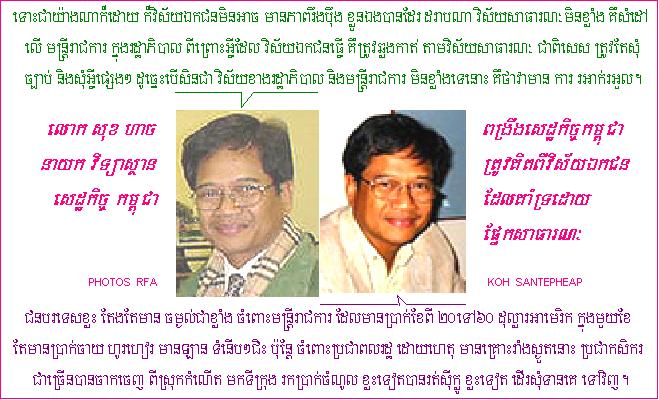 |
|
|
|
|
|
|
|
( PREVIOUS ) |
|
|
|
|
|
|